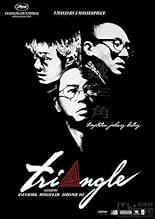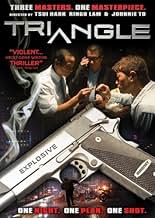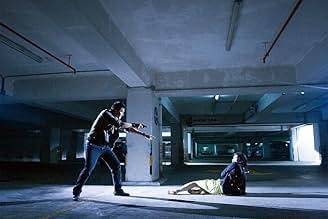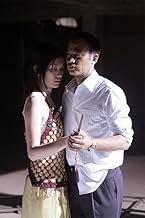Told in three 30-minute segments, three friends seek out the buried treasure of a mysterious stranger.Told in three 30-minute segments, three friends seek out the buried treasure of a mysterious stranger.Told in three 30-minute segments, three friends seek out the buried treasure of a mysterious stranger.
- Awards
- 2 wins & 1 nomination total
Honglei Sun
- Mok Chung Yuan
- (as Sun Hong Lei)
Ka-Tung Lam
- Wen
- (as Lam Ka Tung)
Kai Wa Chan
- Kwan
- (as Chan Kai Wa)
Chun Yip
- Chan Fok-sui
- (as Yip Chun)
Libby Brien
- Fai's Mother
- (voice: English version)
- …
Philip Hersh
- Wen
- (voice: English version)
Chi-Shing Chiu
- Mob Boss
- (uncredited)
6.21.9K
1
2
3
4
5
6
7
8
9
10
Featured reviews
Three is the Magic Number
The idea behind this film was to get three of the best Hong Kong action/crime directors today working together. The result was each did one segment (around 30 minutes each) in chronological order with Tsui first, Lam second and To finishing it off. This would be done differently than a film like Four Rooms (1995) where each segment was basically a separate story. In this movie each director would continue after the other to move the story and characters along from what happened previously. Like many conceptual films this movie sometimes seems a bit forced, sometimes clunky, some plot angles hang, disappear and seem a bit confusing, but I still found the movie quite interesting and entertaining.
Triangle (the Chinese title is The Iron Triangle) starts off with Tsui Hark creating the foundation for the plot. It is both good and bad that Hark creates tons of plot angles for the movie to go. It gives the Ringo and later To plenty of room to move with, but also will leave either a bit too much to be either ignored and some angles barely gone over that a tighter script would have just ignored. In fact it took me a few tries to get past the beginning.
Simon Yam (PTU, Election) is Lee Bo Sam a former race driver who is friends with Fai (Louis Koo: Throwdown) and antique shop owner Mok Chung-yuan (Sun Hong Lei: Seven Swords). Fai is trying to get him to acquiesce to a driving job for a jewelry heist. If he does not Fai will receive harm from some local triad members. All three need money though. In the middle of the meeting between Fai and Lee a strange man gives those three a small gold piece and states where they can find the rest of this treasure. His motives for doing this are a mystery to the bunch. Meanwhile Lee's wife Lin (Kelly Lin: Sparrow) is having an affair with policeman Wen (Gordon Lam), states that her husband is trying to have her killed off and wants Lam to get rid of Sam first.
When Ringo Lam takes over in the first film he has directed since leaving the production of Wake of Death (2004), he ups the psychological attitude of the film and enriches the characterization. The most effective change is how the love-triangle relationship between Lam, Lin and Sam no longer appears to be the stereotypical triangle in the beginning and takes on a new bizarre dimension. Ringo Lam does a homage to Reservoir Dogs which was based on his film City on Fire so you see a homage to an homage) by using a record player, a handcuffed cop and a few other scenarios in this middle segment of the film.
The last segment belongs to Johnnie To and from the beginning where we see Lam Suet (Lam is in a lot of Johnnie To movies) we know who is directing this. Suet plays a drug addicted epileptic who causes flats in both automobiles and bikes and offers to fix them. The area where he is in has no cellular reception and a conveniently located eatery where they can wait while their vehicle is being fixed. However, Wen is there as well as the triad members who are there to purchase firearms. This is another use of the triangle in this film. To offers his normal use of "Team Spirit" themes and Mexican standoff action in this conflict triangle to make the last half hour quite interesting.
While this film never fully jells together, some plot changes are just a bit bizarre like Lin's character change (or really non-use) in the third segment, I still ended up really liking this film. There are quite enough brilliant moments that make this movie a recommendation for fans of not only Hong Kong cinema and Johnnie To, but movie fanatics as well. You just have to get past the first 15 minutes.
I have the Magnolia pictures R1 release that has two extra features: a "Making of" and a Behind the Scenes. The "Making of" is solely focused on Johnnie To's segment and ultimately not that interesting. It is mostly standing around, saying a few lines and more waiting. Behind the Scenes actually has the most information with interviews from several of the cast and crew. The region 3 release of this by Mega Star has deleted scenes, TV spots and trailers in addition to what the R1 has. I was most disappointed that the R1 does not have the deleted scenes, but it is still a worthwhile release.
Triangle (the Chinese title is The Iron Triangle) starts off with Tsui Hark creating the foundation for the plot. It is both good and bad that Hark creates tons of plot angles for the movie to go. It gives the Ringo and later To plenty of room to move with, but also will leave either a bit too much to be either ignored and some angles barely gone over that a tighter script would have just ignored. In fact it took me a few tries to get past the beginning.
Simon Yam (PTU, Election) is Lee Bo Sam a former race driver who is friends with Fai (Louis Koo: Throwdown) and antique shop owner Mok Chung-yuan (Sun Hong Lei: Seven Swords). Fai is trying to get him to acquiesce to a driving job for a jewelry heist. If he does not Fai will receive harm from some local triad members. All three need money though. In the middle of the meeting between Fai and Lee a strange man gives those three a small gold piece and states where they can find the rest of this treasure. His motives for doing this are a mystery to the bunch. Meanwhile Lee's wife Lin (Kelly Lin: Sparrow) is having an affair with policeman Wen (Gordon Lam), states that her husband is trying to have her killed off and wants Lam to get rid of Sam first.
When Ringo Lam takes over in the first film he has directed since leaving the production of Wake of Death (2004), he ups the psychological attitude of the film and enriches the characterization. The most effective change is how the love-triangle relationship between Lam, Lin and Sam no longer appears to be the stereotypical triangle in the beginning and takes on a new bizarre dimension. Ringo Lam does a homage to Reservoir Dogs which was based on his film City on Fire so you see a homage to an homage) by using a record player, a handcuffed cop and a few other scenarios in this middle segment of the film.
The last segment belongs to Johnnie To and from the beginning where we see Lam Suet (Lam is in a lot of Johnnie To movies) we know who is directing this. Suet plays a drug addicted epileptic who causes flats in both automobiles and bikes and offers to fix them. The area where he is in has no cellular reception and a conveniently located eatery where they can wait while their vehicle is being fixed. However, Wen is there as well as the triad members who are there to purchase firearms. This is another use of the triangle in this film. To offers his normal use of "Team Spirit" themes and Mexican standoff action in this conflict triangle to make the last half hour quite interesting.
While this film never fully jells together, some plot changes are just a bit bizarre like Lin's character change (or really non-use) in the third segment, I still ended up really liking this film. There are quite enough brilliant moments that make this movie a recommendation for fans of not only Hong Kong cinema and Johnnie To, but movie fanatics as well. You just have to get past the first 15 minutes.
I have the Magnolia pictures R1 release that has two extra features: a "Making of" and a Behind the Scenes. The "Making of" is solely focused on Johnnie To's segment and ultimately not that interesting. It is mostly standing around, saying a few lines and more waiting. Behind the Scenes actually has the most information with interviews from several of the cast and crew. The region 3 release of this by Mega Star has deleted scenes, TV spots and trailers in addition to what the R1 has. I was most disappointed that the R1 does not have the deleted scenes, but it is still a worthwhile release.
Noirish combination movie 3 clocks by the WatchMaker
My clockmaker friend was not pleased. His rating system is such: If you look at your watch once, its a good movie. Twice is pushing your luck and three times and you're out of luck. ( No clock being the perfect movie ). He took 3 looks. Though having some decent scenes you sort of get a mixed bag of plotting, double-crossing and old style Tsui Hark slapstick. Still we found it worth talking about afterward a bit, so maybe its worth a look... Side plots aren't concluded and motivations aren't all too clear, the segmentation isn't really clear, you don't really see the 3 parts differentiate from each other. Still, could have fared worse since for a change the action was not the consuming theme, instead the few fights being portrayed in what i'd imagine to be a realistic fashion, won't tell more.. Some good comedy , good milieu, gotta be fair it had some OK content to it too.
Totally underrated
With all the negative reviews and opinions I had read about Triangle before watching the film, I expected to be disappointed. Actually, I was pleasantly surprised.
Triangle is by no means a masterpiece that lives up to any of the three directors' names, but it is certainly not the incoherent mess some people make it out to be. Tsui's first third establishes too many subplots, but I thought that even in Lam's third, I was able to follow everything. Sun Honglei really shines in the film, and it would be great seeing him in other Milkyway films. But what's most important is that despite the slightly confusing plot, Triangle always remains an entertaining movie - from the great car chases in Lam's segment to the typical Johnnie To shootouts in the final third, it always kept me on the edge of my seat. Great music has become a staple in Milkyway productions since the last few years, but Zerafa's score here shows strokes of brilliance, adding to the mythical tone established by Tsui in the first third. And that piece playing in the credits is beautiful!
I also really liked the ending, which in a way comments on the theme of "fate" which I thought was illustrated pretty well throughout the movie.
Sure, you perhaps need to be a huge, huge fan of at least one of the directors present here (To's style seems to be prevalent, even in the segments not directed by him) to appreciate this film, but I thought it was pretty great. Maybe people just need to be a bit more open-minded and not expect a masterpiece from three legendary directors who are just having a bit of fun - and contrary to what others said, I felt I was able to participate in that fun.
Triangle is by no means a masterpiece that lives up to any of the three directors' names, but it is certainly not the incoherent mess some people make it out to be. Tsui's first third establishes too many subplots, but I thought that even in Lam's third, I was able to follow everything. Sun Honglei really shines in the film, and it would be great seeing him in other Milkyway films. But what's most important is that despite the slightly confusing plot, Triangle always remains an entertaining movie - from the great car chases in Lam's segment to the typical Johnnie To shootouts in the final third, it always kept me on the edge of my seat. Great music has become a staple in Milkyway productions since the last few years, but Zerafa's score here shows strokes of brilliance, adding to the mythical tone established by Tsui in the first third. And that piece playing in the credits is beautiful!
I also really liked the ending, which in a way comments on the theme of "fate" which I thought was illustrated pretty well throughout the movie.
Sure, you perhaps need to be a huge, huge fan of at least one of the directors present here (To's style seems to be prevalent, even in the segments not directed by him) to appreciate this film, but I thought it was pretty great. Maybe people just need to be a bit more open-minded and not expect a masterpiece from three legendary directors who are just having a bit of fun - and contrary to what others said, I felt I was able to participate in that fun.
It wasn't all it could have been...
For a movie that has been put together by three of the heavyweight directors of Hong Kong cinema, you would expect nothing short of a masterpiece to be the end result. However, that was not really the case with "Triangle".
Don't get me wrong, I am not saying that "Triangle" is a bad or boring movie, far from it actually. The storyline in the movie is good and well put together, although it just tended to drag on in long sequences. There are far better movies available from the Hong Kong cinema compared to this one.
Aside from the three directors, then "Triangle" does have some rather good and established Hong Kong actors to the cast list; Louis Koo and Simon Yam really did carry the movie quite nicely.
There is a lot of action in the movie, which works out quite well, however the last part of the movie that takes place in a small outdoors food vendor in the nature (I assume this is somewhere in the New Territories) tended to become a little too much, especially because there was some comedy and humor attended to throw into that scene, which just ended up making the scene worse.
"Triangle" is a solid enough movie with good performances, however, I had just initially expected something extraordinary to come from a collaboration between Tsui Hark, Ringo Lam and Johnnie To.
Don't get me wrong, I am not saying that "Triangle" is a bad or boring movie, far from it actually. The storyline in the movie is good and well put together, although it just tended to drag on in long sequences. There are far better movies available from the Hong Kong cinema compared to this one.
Aside from the three directors, then "Triangle" does have some rather good and established Hong Kong actors to the cast list; Louis Koo and Simon Yam really did carry the movie quite nicely.
There is a lot of action in the movie, which works out quite well, however the last part of the movie that takes place in a small outdoors food vendor in the nature (I assume this is somewhere in the New Territories) tended to become a little too much, especially because there was some comedy and humor attended to throw into that scene, which just ended up making the scene worse.
"Triangle" is a solid enough movie with good performances, however, I had just initially expected something extraordinary to come from a collaboration between Tsui Hark, Ringo Lam and Johnnie To.
Don't waste your time, so many better films from Asia to watch
If a movie can't hold your interest in the first 25 minutes, it's over as far as I'm concerned. This concept that you have to simply deal with a slow first third of a movie and be rewarded later is nonsense. A good movie has to start and end strong. It all seem interesting and some decent shots and lots of promise, but ultimately muddled and irrelevant. There are so many other movies from Asia to watch, many of which I am sure most of you have not seen, that I would really skip this one and look elsewhere. Why exactly does IMDb require a 10 line minimum for reviews? I said my piece and I hope this helps a few of you move on to the next film.
Did you know
- TriviaAfter Tsui completed the first segment of Triangle, Lam looked at the development of it before shooting the second part, and handed the film to Johnnie To who completed the third part with its conclusion.
- SoundtracksLOVE IS LIKE A BALLOON
Performed by Xiu Qiong Pan
Composed by Yao Ming
Lyrics by Chen Di Yi
OP: EMI Music Publishing Hong Kong
Sound recording license courtesy of EMI Music Hong Kong
Details
- Release date
- Countries of origin
- Official sites
- Languages
- Also known as
- 鐵三角
- Filming locations
- Production companies
- See more company credits at IMDbPro
Box office
- Budget
- $5,000,000 (estimated)
- Gross worldwide
- $4,641,637
- Runtime
- 1h 33m(93 min)
- Color
- Sound mix
- Aspect ratio
- 2.35 : 1
Contribute to this page
Suggest an edit or add missing content
































